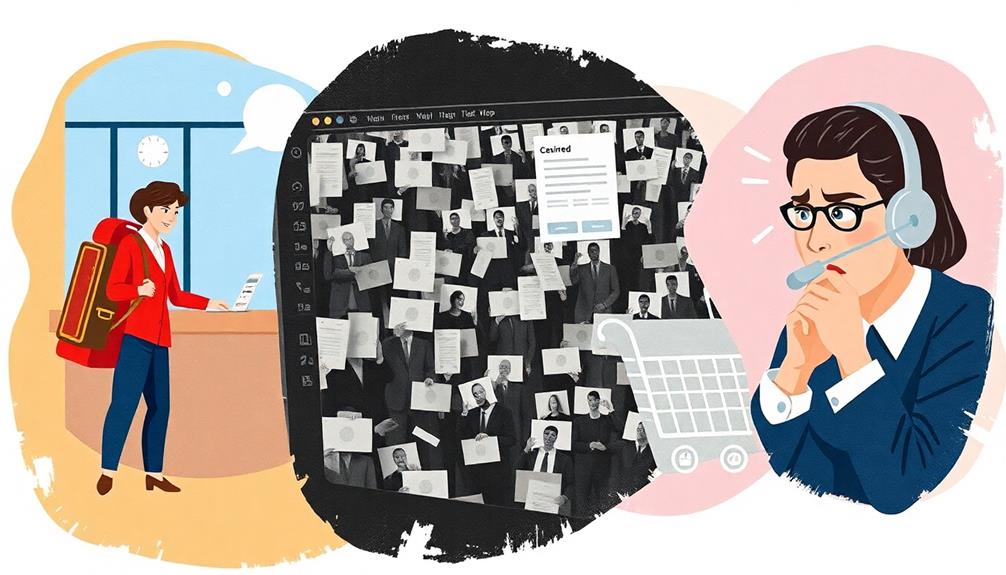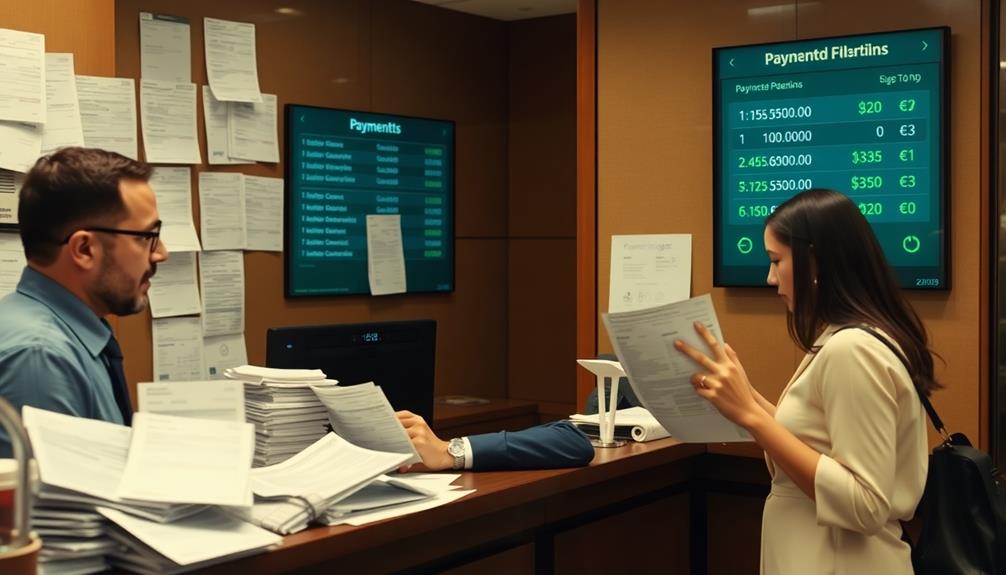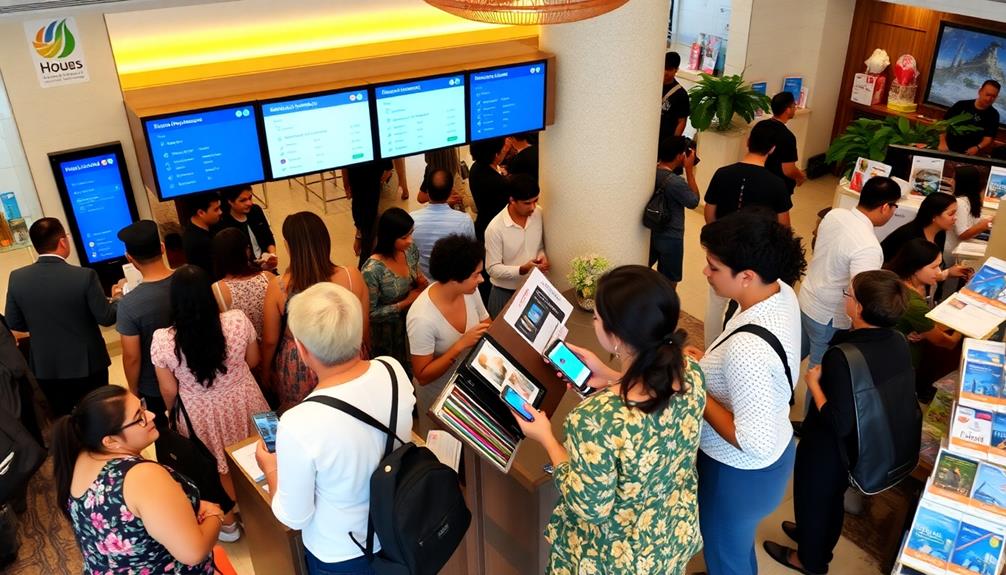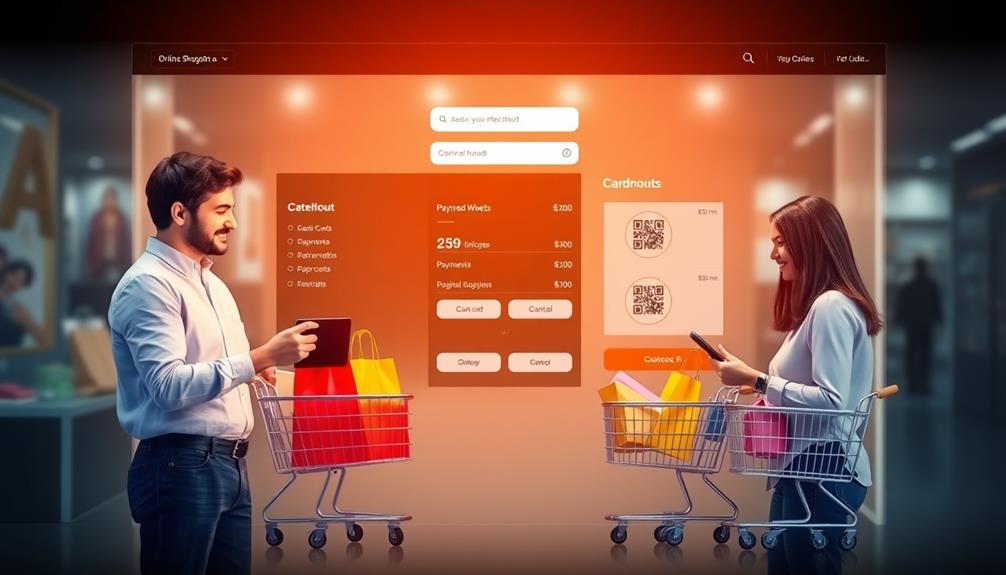In the travel and hospitality sector, you face considerable payment challenges, like high fraud rates, complex billing, and inconsistent payment methods. With a 13.4% payment failure rate and a revenue loss of £5.45 billion in 2022, these issues hurt your bottom line. Implementing centralized systems and utilizing secure options like virtual cards can streamline processes and enhance security. Quick refund expectations also require your attention, as 81% of shoppers expect refunds within a week. Tackling these challenges not only builds trust but can greatly improve customer satisfaction. Stick around to explore strategies that can help you navigate these hurdles more effectively.
Key Takeaways
- The average payment failure rate in the travel sector stands at 13.4%, leading to significant revenue loss and customer dissatisfaction.
- Only 15% of hospitality enterprises have fully integrated payment solutions, causing inconsistent payment methods and increased fraud risks.
- Misplaced receipts and last-minute cancellations complicate expense reconciliation, highlighting the need for centralized management and virtual card solutions.
- Instant refunds are expected by 81% of shoppers, making fast processing essential for customer trust and repeat business.
- Open banking enhances the refund experience and reduces delays, offering a modern solution to traditional payment challenges.
Overview of Payment Challenges

Payment challenges in the travel and hospitality industry are significant, with a staggering 13.4% average failure rate for consumer payments. This failure results in frustration for you and potential revenue loss for operators, which amounted to £5.45 billion in the UK alone in 2022.
Fragmented payment systems only exacerbate the issue; only 15% of enterprises currently have fully integrated payment solutions. This leads to slow checkout processes, which can negatively impact your overall experience.
Additionally, the significance of monitoring credit card statements to catch fraud is increasingly relevant in this sector. Security concerns also loom large, with 68% of hospitality executives citing fraudulent payments as a primary issue. It's vital for businesses to implement robust measures to protect customer data, especially when data breaches can cost an average of $3.36 million per incident.
Furthermore, travelers today demand diverse payment methods. You likely use a mix of debit and credit cards, cash, rewards points, and even prepaid gift cards. Accommodating these diverse payment options is essential for enhancing your customer experience.
Lastly, the rise in demand for instant refunds post-COVID-19 highlights that 82% of travelers scrutinize refund policies. Payment solutions need to provide rapid and automated refund capabilities to maintain your trust.
Inconsistent Payment Methods

Steering through the travel and hospitality landscape can be frustrating when you're faced with inconsistent payment methods. With only 15% of hospitality enterprises reporting fully integrated payment solutions, you're likely to encounter confusion when it comes to paying for services. Often, hotels accept a mix of credit cards, virtual cards, and direct billing, complicating your tracking of expenses.
To illustrate the issue, consider the following table:
| Payment Method | Security Level |
|---|---|
| Credit Cards | Moderate |
| Virtual Cards | High |
| Direct Billing | Low |
A recent survey showed that 48% of consumers in the UK/Ireland prefer multiple payment options, underscoring the need for travel operators to adapt. The lack of secure payment methods raises the risk of fraud, with 68% of hospitality executives citing this as a major concern. Implementing centralized travel management systems can streamline payment options, making it easier for you to manage expenses and ensuring you always have secure payment solutions. By addressing these inconsistent payment methods, the travel experience can become smoother and more reliable.
Reconciliation Difficulties

Maneuvering through the intricacies of expense reconciliation in travel and hospitality can be an intimidating task. You often face reconciliation difficulties due to misplaced receipts, which considerably increase the workload for your HR and finance departments.
Last-minute booking cancellations complicate your efforts, leading to discrepancies and additional administrative burdens that consume time and resources. Additionally, just as discount appliance retailers offer budget-friendly options, finding cost-effective solutions for managing travel expenses is vital in maintaining your budget.
To simplify this process, consider using one-time virtual cards that link specific transactions to bookings. This method reduces manual efforts and minimizes errors, making your expense reconciliation more efficient.
However, the average cost of handling expense reconciliation rises with the number of payment methods used. This underscores the significance of implementing centralized travel management systems that streamline your operations.
Effective reconciliation processes are essential since they directly influence employee satisfaction and guarantee the accuracy of your financial reports. When you tackle these reconciliation difficulties head-on, you enhance not only your team's morale but also the overall efficiency of your business operations.
Fraud and Security Risks

Maneuvering the landscape of fraud and security risks in the travel and hospitality industry demands your immediate attention. With 68% of hospitality executives citing fraudulent payments as their primary concern, the threat is considerable.
In 2023, the average data breach expense in your sector reached a staggering $3.36 million, highlighting the financial impact of security violations. To address these challenges, implementing efficient payment solutions that focus on security features can greatly enhance your business's defenses.
Siloed payment systems only exacerbate the fraud issue, making it tough to achieve a thorough view of customer data. This not only increases operational risks but also complicates your payment processing efforts.
Chargeback fraud poses another challenge, with up to 86% of chargebacks possibly involving friendly fraud, complicating recovery strategies.
Implementing Strong Customer Authentication (SCA) measures can appreciably reduce your fraud risks. By integrating SCA into open banking, you can promote safer transaction environments, protecting both your business and your customers.
Prioritizing data security is essential; without it, your operations might face crippling financial consequences. It's vital to stay ahead of these risks and adopt robust strategies to safeguard your revenue and reputation in this complex landscape.
Currency Fluctuations

Currency fluctuations can greatly impact the travel and hospitality industry, creating unexpected expenses for both travelers and companies.
When you're traveling internationally, dealing with multiple currencies and changing exchange rates can make budgeting a challenge. This unpredictability can be similar to the tax implications of Gold IRAs, where understanding the nuances can lead to better financial planning.
To manage these risks, consider these tips:
- Use payment options that lock in rates: Booking with services that secure exchange rates at the time of payment can prevent surprises down the line.
- Opt for corporate credit cards: They typically offer favorable exchange rates and low foreign transaction fees, which can save your business money.
- Stay informed about currency trends: Understanding market fluctuations can help you plan better and avoid costly last-minute conversions.
- Implement effective currency management strategies: This can help guarantee accurate budgeting and help you minimize costs.
- Keep an eye on transaction fees: Different payment options come with various fees, so choose wisely to avoid unnecessary expenses.
Complex Billing Arrangements

When traveling, managing finances isn't just about dealing with currency fluctuations; it also involves maneuvering complex billing arrangements that can complicate your experience.
Business travelers frequently encounter issues like splitting bills and direct billing, which can lead to confusion if not clearly communicated. To navigate these complexities effectively within the hospitality sector, companies should establish transparent billing policies, similar to guidelines for Louisiana alimony laws that emphasize clear communication.
It's essential for companies to establish transparent billing policies to navigate these complexities effectively within the hospitality sector.
To enhance your payment experience, consider using pre-authorization forms before your hotel stay. These forms clarify billing details upfront, reducing misunderstandings and potential disputes.
Furthermore, implementing centralized billing systems can greatly streamline the process. By funneling expenses through a single point, these systems simplify management for corporate travel and help eliminate errors that often burden finance departments during reconciliation efforts.
When billing arrangements are unclear, not only do you face inconvenience, but it can also create administrative headaches for those back at the office.
Instant Refund Expectations

When you book a trip, you expect a hassle-free experience, especially when it comes to refunds.
With 81% of shoppers wanting their refunds processed within a week, the demand for timely reimbursements in travel is clear.
This expectation mirrors the importance of planning ahead in various aspects of life, such as ensuring that financial responsibilities are clearly defined and understood, as seen in family caregiver contracts.
Open banking solutions can provide the fast refunds you need, helping to build trust and loyalty with your travel providers.
Refund Timeliness Importance
Many travelers today expect instant refunds after cancellations, and it's no surprise that this demand has surged post-COVID-19. With 82% of travelers scrutinizing refund policies, the significance of timely refunds can't be overstated.
Customers want reassurance that their money will return quickly, especially after unexpected disruptions. This expectation mirrors the efficiency seen in systems like geothermal heat pumps, which achieve energy savings of 30% to 70% on costs through ideal performance and reliability efficiency ratings that enhance customer satisfaction.
Here are some key reasons why refund timeliness is essential:
- Trust Building: Quick refunds enhance customer trust and satisfaction.
- Loyalty Incentive: 85% of merchants believe fast refunds lead to repeat business.
- Consumer Expectations: 81% of online shoppers expect refunds within a week or less.
- Frustration from Delays: Traditional payment methods often result in frustrating delays during cancellations.
- Adoption of Open Banking: Solutions like TrueLayer can facilitate instant refunds, improving customer experience.
In a landscape where payment fraud remains a concern, ensuring a seamless and fast refund process not only keeps customers happy but also strengthens your brand's reputation.
Embracing faster, more efficient payment methods is vital for any business looking to thrive in the travel and hospitality sector.
Open Banking Benefits
Open banking is revolutionizing the way travelers experience refunds, making instant resolutions a reality. With 82% of travelers closely examining refund policies after COVID-19 cancellations, quick resolutions have become essential for customer satisfaction.
Today's consumer preferences lean heavily toward speedy service, and 81% of online shoppers expect refunds within a week or less. This shift presents a challenge the hospitality industry faces, as traditional payment methods often fall short, leading to frustrating delays that can erode customer trust.
Investing in precious metals can also be seen as a long-term strategy to mitigate financial risks associated with market volatility.
However, open banking payments, like those offered by TrueLayer, can bridge this gap. They enable instant refunds, drastically improving your payment experience during cancellations.
Automated refunds not only maintain trust during disruptions but also enhance loyalty—85% of merchants recognize their importance in retaining customers.
Chargeback and Fraud Issues

Chargebacks and fraud issues pose significant challenges for the travel and hospitality industry, with nearly 86% of chargebacks attributed to friendly fraud. This type of fraud complicates recovery efforts for travel providers, especially when you reflect that UK operators faced potential losses of £5.45 billion due to failed payments in 2022.
The financial impact is staggering, particularly for high Average Transaction Value (ATV) businesses, which spend around £235,000 annually on chargeback management. To combat these challenges effectively, businesses are increasingly turning to advanced fraud detection techniques that leverage machine learning and real-time monitoring systems.
As a player in the travel industry, you need to be aware of these challenges and take proactive measures. Here are some key points to contemplate:
- Understand the high risks associated with chargeback fraud.
- Implement robust compliance measures to mitigate fraud.
- Train your staff on detecting and managing chargeback incidents.
- Utilize advanced technology to track transaction patterns.
- Foster open communication with customers to resolve issues before they escalate.
Only 10% of low ATV merchants report experiencing chargebacks, while a significant 26% of high ATV businesses struggle with these issues. By addressing chargeback and fraud problems, you can protect your bottom line and enhance your customer relationships.
Future Payment Solutions

The future of payment solutions in the travel and hospitality industry is set to transform how you manage transactions and enhance customer experiences. As the travel sector shifts towards digital and instant payment solutions, the adoption of open banking payments is becoming essential.
With over 7 million open banking payments made in the UK as of October 2022, this trend reflects a notable move towards convenience. Additionally, integrating cryptocurrency options like a Bitcoin IRA can offer unique investment opportunities that align with the preferences of tech-savvy travelers.
Instant bank transfers, supported by Strong Customer Authentication (SCA), minimize fraud risks while streamlining the payment process. This is particularly important for businesses with high Average Transaction Values, as it addresses ongoing challenges. You'll find that 81% of online shoppers expect refunds within a week or less, so offering instant refunds through open banking can greatly boost customer loyalty.
Next-generation payment solutions provide access to essential financial data, allowing you to enhance your payment systems. Collaborating with fintech firms will drive innovation and improve user experiences while ensuring compliance with emerging regulations.
Embracing these future payment solutions won't only simplify transactions but also align your offerings with evolving customer expectations, making your services more competitive in the travel industry.
Frequently Asked Questions
What Is the Financial Challenge in the Hospitality Industry?
You face significant financial challenges in the hospitality industry, like fluctuating cash flow, high operational costs, and delayed payments. These factors require strategic planning to guarantee your business remains viable throughout varying market conditions.
What Are the Key Challenges Facing the Tourism and Hospitality Industry Today?
What's more frustrating than planning a perfect trip only to face overcrowding or service delays? Today, you'll encounter staffing shortages, fluctuating demand, and evolving regulations that challenge the tourism and hospitality industry. Stay adaptable!
What Are the Common Problems in Hospitality Industry and Their Solutions?
In the hospitality industry, you often face issues like slow service, inconsistent quality, and staff shortages. To tackle these, focus on training, streamline processes, and embrace technology to enhance customer experience and operational efficiency.
What Is a Major Challenge to the Hospitality Industry?
"Where there's smoke, there's fire." A major challenge you face in the hospitality industry is managing fragmented systems. This leads to inefficiencies, guest dissatisfaction, and increased vulnerability to fraud, ultimately affecting your bottom line.
Conclusion
Maneuvering the payment landscape in travel and hospitality can feel like a journey filled with bumps and detours. But by embracing innovative solutions and adapting to changing needs, you can transform these challenges into opportunities for growth. It's not just about overcoming hurdles; it's about enhancing the experience for your guests and ensuring their trust. Together, let's turn these obstacles into stepping stones, paving the way for a more seamless and secure future in your business.











